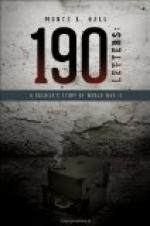December 5, in the morning.
. . . We have come out of our burrows, and three days of imprisonment are followed by a morning in the open. It would be impossible to imagine such a state of mud.
Your pretty aluminium watch is the admiration of everybody.
Is Andre’s wound serious? The mothers endure terrible agony in this war, but courage—nothing will be lost. As for me, I get on all right, and am as happy as one may be.
A terrific wind to-day, chasing the fine clouds. Keen air, in which the branches thrive. Beautiful moonlight on all these nights, all the more appreciated if one has been cheated of the day.
Dear, I am writing badly to-day because we are bewildered by the full daylight after those long hours of darkness, but my heart goes out to you and rests with you.
. . . Let us bring to everything the spirit of courage. Let us have confidence in God always, whatever happens. How much I feel, as you do, that one can adore Him only with one’s spirit! And like you I think that we must avoid all pride which condemns the ways of other people. Let our love lead us in union towards the universal Providence. Let us, in constant prayer, give back our destiny into His hands. Let us humbly admit to Him our human hopes, trying at every moment to link them to eternal wisdom. It is a task which now seems full of difficulty, but difficulty is in everything in life.
Sunday, December 6.
I am happy to see you so determinedly courageous. We have need of courage, or, rather, we have need of something difficult to obtain, which is neither patience nor overconfidence, but a certain belief in the order of things, the power to be able to say of every trial that it is well.
Our instinct for life makes us try to free ourselves from our obligations when they are too cruel, too oft-repeated, but, as I am happy to know, you have been able to see what Spinoza understood by human liberty. Inaccessible ideal, to which one must cling nevertheless. . . .
. . . Dear mother, these trials that we must accept are long, but notwithstanding their unchanging form one cannot call them monotonous, since they call upon courage which must be perpetually new. Let us unite together for God to grant us strength and resource in accepting everything. . . .
You know what I call religion: that which unites in man all his ideas of the universal and the eternal, those two forms of God. Religion, in the ordinary sense of the word, is but the binding together of certain moral and disciplinary formulas with the fine poetic imagery of the great biblical and Christian philosophies.
Do not let us offend any one. Looked at properly, religious formulas, however apart they may remain from my own habit of mind, seem to me praiseworthy and sympathetic in all that they contain of aspiration and beauty and form.
Dear mother whom I love, let us always hope: trials are legion, but beauty remains. Let us pray that we may long continue to contemplate it. . . .




